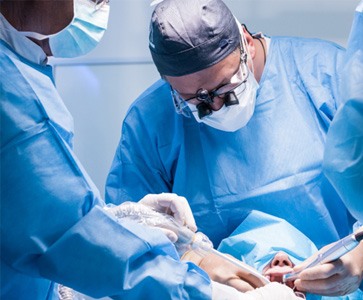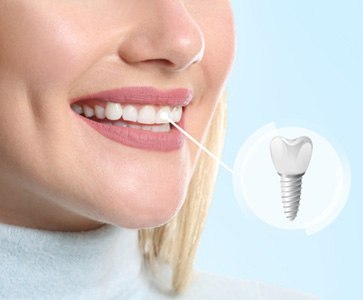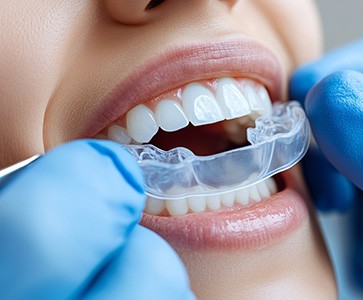Dental Implants – Larchmont Village, CA
The Modern Gold Standard for New Teeth
No one should have to struggle with a smile that isn’t complete. After all, not only is your oral health damaged by missing teeth, but so is your sense of self-confidence. At Geller Dentistry, we’re dedicated to providing precise, quality care that creates ideal results and exceeds your expectations. That’s why we’re happy to offer dental implants near Hancock Park as a state-of-the-art tooth replacement option that promises patients satisfying health and aesthetic benefits.
As one of fewer than 20 board-certified prosthodontists in the Los Angeles area, Dr. Benjamin Geller has the experience and training necessary to handle every part of your dental implant process, from placement to restoration and beyond. We also work with other dental specialists in the area including periodontists and oral surgeons if and when it may be necessary. We look forward to giving you a new reason to smile, so call our office to schedule a consultation!
Why Choose Geller Dentistry for Dental Implants?
- Entire Procedure Completed In-House
- Care from a Board-Certified Prosthodontist
- Fully Open About Your Treatment Options
What are Dental Implants?

By itself, a dental implant does not look much like a tooth. Instead, it resembles a small screw made out of titanium. It is meant to be placed in the jaw so that it can support the crown, bridge, or denture that will be used to complete your smile. The main advantage of having dental implants placed is that they can fulfill the same functions as your natural tooth roots, which makes them the only tooth replacement solution capable of preventing bone loss in your jaw.
The 4-Step Dental Implant Process

Dental implants offer one of the best solutions for completely rebuilding missing teeth from the roots up. Not only can they restore your bite, but they can also help preserve great oral and overall health. To ensure a successful treatment, the process involves multiple steps that are crucial for creating the potentially lifelong results you deserve. Keep reading to learn how dental implants work and what to expect from the procedure.
Initial Dental Implant Consultation

Similar to most dental treatments, you’ll begin with an initial consultation with Dr. Geller so that he can evaluate your oral health and determine if you’re a good candidate for the treatment. If you have any underlying issues such as decay, gum disease, or insufficient jawbone density, then we’ll need to provide you with the proper methods to get your mouth up to speed for dental implants. This can involve performing gum disease treatment, bone grafting, or tooth extractions—whichever is necessary to help you prepare to undergo dental implant surgery.
Dental Implant Surgery

Once we’ve determined that you're a viable candidate for dental implants, your procedure will begin with the surgical placement of your new implants (the “roots”) into the appropriate sockets. Dr. Geller will handle this process personally, ensuring that everything goes as precisely and comfortably as possible. Before beginning, you’ll be given a local anesthetic to numb your mouth so that you’re pain-free while we make an incision in your gums to access your jawbone. After placing your metal posts, we’ll suture your gums closed and place a dental cap to keep your implant safe while you heal.
Dental Implant Osseointegration & Abutment

A period of healing will follow, during which your new implants will create a gradual bond with your jawbone, setting the stage for your new, custom-made restorations that are fabricated by our convenient on-site lab. While many dentists have to send out their restorations to be crafted by professionals, Dr. Geller is happy to offer the convenience and exceptional quality that an in-house laboratory can provide to patients! After completing osseointegration, you’ll return to our office to have your abutment(s) placed—small connector pieces that connect your restoration to your implant.
Delivery of Dental Implant Restoration(s)

Once your gums have recovered from the previous appointment, you’ll return to our Los Angeles practice so that we can securely place your brand-new crown(s) or prosthetics and make any last-minute changes needed. The final result is so beautifully seamless that you may even forget they’re not natural teeth after some time has passed!
Benefits of Dental Implants

Did you know that according to the American Academy of Implant Dentistry, 500,000 people get dental implants every year? There are a lot of reasons why this revolutionary treatment is becoming the preferred tooth replacement option for both patients and dentists alike. Dental implants recreate missing teeth from the roots up, which gives them numerous important advantages over traditional restorations like dentures and dental bridges. When you choose to replace your missing teeth with dental implants, you’ll enjoy benefits for your day-to-day life, your overall health, and your long-term well-being!
Day-to-Day Benefits

- Enjoy an unrestricted diet: Have you been avoiding steak, apples, nuts, or any other foods because of your dentures or a dental bridge? With dental implants, you can eat all your favorite foods easily and comfortably! Dental implants restore around 80% of your natural biting power, meaning you can eat nearly anything without issue.
- No changes to your oral hygiene routine: Not only do dental implants look and act like natural teeth, but they can be cared for just as easily as well! Dentures and dental bridges require special cleaners and brushes, along with adjustments to your normal oral hygiene routine. Meanwhile, you can brush and floss dental implants just like natural teeth!
- Smile, laugh, and talk with utmost confidence: Dental implants are anchored securely into your jawbone just like natural teeth, so you’ll never have to worry about them slipping or popping out of place at embarrassing times.
Health Benefits

- No negative impacts on your teeth and gums: Dental bridges require altering your remaining healthy teeth, and dentures can cause sores on your gums. Dental implants are self-supporting, making them the healthiest option for the rest of your mouth!
- Turn the clock back and prevent premature aging: Of all the tooth replacement options, dental implants are the only one that stimulates the jawbone to prevent jawbone reabsorption. Bone deterioration in your jaw happens naturally after tooth loss, and it can diminish your facial features and lead to a sunken, aged appearance! Dental implants can help keep you looking young and healthy by stopping bone reabsorption in its tracks.
Long-Term Benefits

- A success rate that you can feel confident about: The success rate for dental implants is extremely high, typically close to 95%!
- Permanent results for your smile: While dentures and dental bridges need to be replaced every few years, dental implants are designed to last for decades. In fact, with proper care, most patients enjoy their dental implants for life!
- Save thousands of dollars in the long run: It’s true that dental implants have a significantly higher up-front cost than dentures and dental bridges. However, studies report that over time, dental implants are usually the most cost-effective option. Dentures and dental bridges wear down every 5-10 years, so dental implants can potentially save you thousands of dollars in replacements alone!
Who Dental Implants Can Help

After hearing all of the wonderful benefits of dental implants, you might be wondering, “Am I a candidate?” Fortunately, many patients who are struggling with tooth loss are! Of course, the treatment process will look different depending on how many teeth you’ve lost, as outlined below. So, feel free to read on or give us a call if you want to learn more.
Who Is a Good Candidate for Dental Implants?

Are you a candidate for dental implant placement? The answer is most likely yes as long as you’re an adult who:
- Is missing at least one tooth.
- Has good oral health overall.
- Doesn’t have any health conditions that would prevent implant surgery from being performed.
- Is willing to commit to the implant process, which can take several months.
- Has enough jawbone density to support the dental implant posts.
- Can commit to practicing optimal oral hygiene after implants are in place.
Ultimately, the best way to find out if you’re a candidate is by scheduling an appointment at our Larchmont Village dental office so we can conduct an exam.
Missing One Tooth

In this situation, the math is simple: you only need one dental implant post to replace a single missing tooth. After it has been placed in your jawbone, a process called osseointegration will begin (which is when the implant and the jawbone will fuse). Once that’s complete, a crown will be secured in place, restoring the visible portion of your tooth as well. Because implant crowns are anchored to your jaw and are designed to match the rest of your smile, they tend to look and feel very natural.
Missing Multiple Teeth

There are a few different ways to restore your smile with implants when multiple teeth are missing. The first is when two or more dental implant posts are used to support a dental bridge, effectively filling in the space left by three or more consecutive teeth. The second is when partial dentures are anchored to dental implants to replace teeth in different parts of the upper or lower arch.
Missing All Teeth

Instead of getting an implant post for every missing tooth, you can have a full denture attached to four or more dental implants. Dentures that are anchored to dental implants are much more stable and won’t shift or slip around in your mouth. Not only that, but they also have better chewing power, they can last for well over a decade, and they help prevent bone loss.
Understanding the Cost of Dental Implants

At first glance, choosing to replace your missing teeth with dental implants can seem like a large expense, but it actually is a wise, long-term investment in your smile. While traditional dentures and bridges need to be replaced roughly every seven to ten years, dental implants can last for multiple decades, potentially saving you money in the long run. To fully understand what goes into the cost of dental implants, keep reading the information below, or contact our team and schedule an appointment!
Preliminary Treatments & Dental Implant Surgery

To be successful, some patients first require gum disease therapy or a bone graft before we attempt to place implants. In that case, we know experienced periodontists and other specialists who can help prepare you for implant placement. In most cases, Dr. Geller can handle the entire process in our Los Angeles office. As a board-certified prosthodontist, he has been highly trained in every facet of the implant process.
The Parts of Your Dental Implant

The foundation of a strong implant replacement tooth is the post. In many cases, it looks like a screw, but this titanium post serves as the new tooth’s root. It is biocompatible, and it promotes new jawbone growth, just like a natural tooth. Once the post has fully integrated with the bone, we can then place the small abutment piece, which connects the post to the restoration.
Final Dental Implant Restoration

Once we have the abutment in position, we can then take impressions of your mouth and create your restoration. Fortunately, we don’t have to have our restorations fabricated at a faraway dental lab. It’s made right here in our office! As a result, Dr. Geller can work directly with our technicians and make sure the prosthetic is the perfect fit for your implant and looks completely natural.
Does My Dental Insurance Cover Dental Implants?

Insurance coverage can vary widely from plan to plan. In general, the restorations involved in the process are covered in part by insurance, but typically, the implant placement portion is not. However, if you require preliminary work, such as gum disease therapy or another procedure, it may be included in your benefits. Before beginning your treatment, we will take a close look at your insurance and explain exactly what you can expect from your dental plan.
Making Dental Implants Affordable

Here at Geller Dentistry, we are proud to be in-network with most PPO dental plans. Our skilled team knows and understands the ins and outs of dental insurance and can help you maximize the coverage you have available. Before you move forward with implants, we’ll review your plan and explain the services that are included in your coverage. As a result, you can know what you’ll be responsible for paying from the beginning.
Dental Implant Post-Op Instructions

Your implant treatment won't simply end with the placement surgery. Once the implants are placed, you’ll need time to recover. This period allows your mouth to slowly heal itself. Luckily, there’s no need to worry about it – we at Geller Dentistry will help your recovery. We’ve thus listed some crucial dental implant post-op instructions. By following them, your whole smile should heal nicely. Get the details by reading below or by calling our office in the coming days.
What to Do Directly After Dental Implant Surgery

More than anything else, leave the forming blood clot untouched after surgery. Otherwise, you’ll delay or even reverse your recovery. You should thus follow these rules:
- Don’t spit. If necessary, swallow your saliva or use a tissue for dabbing.
- Don’t use drinking straws. Their suction force might dislodge your blood clot.
- At a minimum, don’t smoke the day after surgery.
- Keep your fingers and tongue away from the surgical site(s).
Common Side Effects When Recovering from Dental Implant Placement

You'll likely face some side effects in the first few days after implant placement. The most common ones are:
- Intermittent bleeding – Your treatment site may bleed slightly. To lessen this effect, use gauze and light pressure.
- Gum or Facial Swelling – In the first 72 hours post-surgery, your face and gums could swell. Use a cold or warm compress to manage.
- General Discomfort – Your mouth may ache once the surgery’s anesthesia fades. Ease the pain with store-bought pain relievers.
Note that the above effects are temporary; they’ll subside fairly quickly. Please let us know if that isn’t the case for you.
Your Diet After Dental Implant Surgery

Stick to soft, non-abrasive foods in the days after implant surgery. Tougher items may dislodge your blood clot and delay recovery.
Examples of foods to consider are:
- Scrambled eggs
- Mashed potatoes
- Pasta
- (Non-hot) Soup
- Yogurt
- Pudding
- Ice cream
You can resume your normal diet once you feel up to it. Still, try to limit crunchy and tough foods. You should also not chew directly on the implant site(s).
Post-Op Health & Oral Hygiene

Your mouth always needs daily cleaning, even when it’s healing. You should keep maintaining good oral hygiene during your recovery. However, make a few changes as well.
For instance, keep brushing your teeth twice daily. These sessions will protect your treatment site. All the same, be gentle when your brush nears the surgical site. You don’t want to dislodge the blood clot.
It’d also be wise to alter your mouth rinse. If you use a mouthwash with a high alcohol content, you’ll suffer problems. The better option is to do twice-daily rinses with saltwater. This method reduces your post-surgery inflammation.
What to Do After Your New Teeth Are Attached

The hard part is over once your new crown, bridge, or denture is attached. You may feel some minor gum sensitivity, but this symptom fades and is easily managed. Otherwise, you likely won’t endure any unpleasant effects. Instead, you’ll be well enough to enjoy your full grin!
Maintaining & Caring for Your Dental Implants

With proper maintenance, your new dental implants could continue to keep your smile healthy and beautiful for a lifetime. However, this can only happen if you commit to taking care of them. If you don’t protect your dental implants, they can become infected or damaged and potentially fail or need to be replaced.
Here are a few simple precautions and healthy habits that you can adopt to help you ensure that your beautiful smile lasts for the rest of your life!
Make Oral Hygiene a Priority

Though your dental implants cannot get cavities because they are not “real” teeth, you still must practice excellent oral hygiene habits when you have them. This is because oral health problems such as gum disease can cause your dental implants to fail. To care for them, be sure to:
- Brush your teeth (both real and prosthetic) twice a day
- Floss once daily
- Visit Geller Dentistry twice a year for your biannual dental cleanings and exams
- Do not use your dental implants to open packages, bite your nails, or chew anything that is not food
Eat a Healthy Diet

Unlike other, temporary restorations like bridges and dentures, with dental implants you are free to eat a full, nutritious diet. However, you should still make healthy choices and avoid overindulging in hard, sticky, and sugary foods. Be sure to eat foods that are calcium-rich and get plenty of vitamin C to help keep your jawbone strong and your gum tissue healthy to prevent implant failure.
Break Bad Habits

Bad habits like smoking or chewing tobacco can cause your dental implants to break or fail by slowing the healing process and encouraging infection, so try to quit if possible.
Furthermore, be careful not to use your dental implants as tools, such as for biting fingernails or opening packaging. Don’t chew on hard objects like pen caps, either, as these can all damage your restorations.
Protect Your Dental Implants

While your new dental implants are strong and durable, they are not indestructible. Thus, you should take extra measures to protect them if necessary. If you play sports, be sure to wear a sports mouthguard. If you have bruxism (teeth grinding), wear a nightguard to protect them from damage while you sleep. Excess pressure can damage both the crowns of your implants and the implants themselves if you’re not careful.
Schedule Regular Dental Checkups

Finally, just because they’re not “real” teeth doesn’t mean you don’t still need to visit Geller Dentistry regularly. We hope to see that gorgeous grin every six months for your biannual exam and cleaning appointments. This will allow us to monitor your dental implants and any remaining natural teeth, so if we see any issues we can intervene as early as possible.
Dental Implant FAQs
As the most beneficial way to replace missing teeth, dental implants in Hancock Park have exploded in popularity recently. Because of this, more and more patients may have heard rumors or misinformation about them online. To clear things up and help you make a well-informed decision regarding your smile, we’ve answered some of the dental implant questions we get asked the most often here at Geller Dentistry.
Are Dental Implants Right for Me?
Whether you’re missing just one tooth or a whole mouthful, dental implants may be the treatment you need to enjoy the benefits of a full smile again. Most people with some degree of tooth loss would make good candidates for dental implants.
Some patients, however, may have to undergo preliminary procedures beforehand. For example, a lot of patients require a bone graft to ensure the jawbone is strong enough to accommodate implants. Others might need tooth extractions or gum disease therapy first. To determine whether dental implants are right for you, you’ll have to schedule a consultation with Dr. Geller.
Can Dental Implants Replace Front Teeth?
Absolutely! Each implant is topped with a high-quality restoration. This could be a dental crown, bridge, or denture, depending on how many teeth you’re missing. Your restoration will be made to perfectly resemble the pearly whites you were born with by taking detailed impressions of your mouth. Even if you get dental implants in your front teeth, no one but our dental team should be able to tell the difference between them and your natural teeth!
How Long Does the Dental Implant Process Take?
The answer to this question can vary greatly from patient to patient. In general, it takes anywhere from three to six months for the implant posts to fully integrate with your jawbone. From there, it may take another few weeks to receive your abutment (a small metal connector that attaches your restoration to your implants) and then your final restoration. If you need bone grafting before that, it can add another few months of healing time. During your consultation, Dr. Geller can lay out a detailed treatment timeline to give you a more personalized idea of how long the process will take.
I Currently Have a Denture. Can It Be Combined with Dental Implants?
Traditional dentures notoriously lose their fit every few years as the jawbone naturally changes shape after tooth loss. The good news is that dental implants prevent the jawbone from shrinking. Therefore, if your denture is supported by implants, it can last significantly longer before it needs a replacement. We can definitely examine your dentures and your mouth to determine whether you’re a good candidate for an implant-retained denture.
